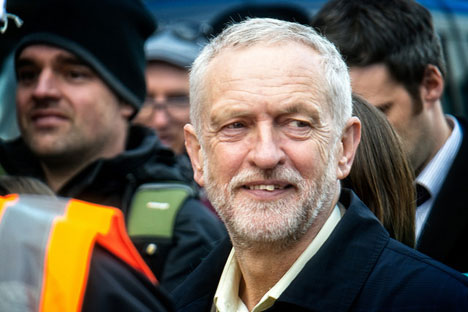Whatever the outcome of the referendum, it looks like the Labour party will have lost. While we can hope that over the remaining days of the campaign, a new head of steam builds and the national conversation shifts from discussion of which Tory faction will be ascendant on June 24 to how we can build for a European future that places egalitarian cosmopolitanism and radical conceptions of citizenship at the centre of the world’s most complex democratic institution: at this point it seems unlikely to happen.

Jeremy Corbyn joins striking junior doctors in London, 26 April 2016. Photo: Garry Knight. Source: Flickr
The soundbites and speeches coming from Labour leader Jeremy Corbyn and shadow chancellor John McDonnell have broadly the right sort of content, but they mostly address a divided Left, not a confused and misled public. And that Left cannot be addressed in the same way as the mainstream “Remain” campaign, unsure as the former is about the European project, torn between an impulse to resist the neoliberal bureaucracy that is destroying Greece and sleepwalking us into TTIP on the one hand and, on the other, the desire to support the social democratic tendencies that promote workers rights, civil liberties and environmental protections. This kind of hedging – we should stay in the European Union and reform it – is the right policy and speaks best to left concerns, but for a wider public battered by the contradictions of the media-friendly internecine Tory civil-war, it just deepens the confusion.
Following the argument made by Anthony Barnett, if “Remain” wins, the story will go, this “win” will have been despite Labour’s feeble efforts. In the event of Brexit, Labour will have been on the losing side and perceptions of a deliberately half-hearted effort for the losers will offer no moral high-ground. A positive, energetic campaign that broadens the political conversation and sows the seed for future debate (in the manner of the Scottish “Yes” campaign) would be the only way Labour could come out of this vote looking good – and this hasn’t happened. The best efforts of Compass with their Good Europe project and the well-framed Another Europe is Possible campaign have been admirable, but these campaigns haven’t had any significant impact on the national debate, which has instead taken the form of a daily diet of questionable and competing facts from antagonistic front-bench ministers. The Tory party may look bad, but they are completely dominant.
What’s happened to make the Left as a whole so moribund in responding to this critical issue? I think it goes to the very heart of left strategy and the original divide, never resolved, and reconstituted with each conjunctural shift, around reform or revolution. In short it is about our understanding of contemporary capitalism and how and with what to replace it.
The revolutionary arguments for Brexit are numerous, but the most explicit, coming from the hard Left, suggest that Brexit and the subsequent chaos for the Conservative party would create conditions in which the bourgeois British state can be overthrown and socialism could be instituted. One line is that without the market regulations of the EU and its competitive neoliberal agenda it would be possible to nationalize key industries and set up some sort of worker’s state under a Corbyn government. But another argument, from the miserabilist school of Marxist thought, goes that freed from the restraining regulation of the EU and combined with a huge expansion in surplus labour (e.g. the unemployment and impoverishment of a substantive chunk of the population), British capitalists would push workers so far that a general shift to the left, if not outright revolution, would be inevitable as the working class would organize and challenge the iniquities of capitalism.
Again, these positions miss the point that a crisis for David Cameron is not necessarily a crisis for a Conservative party with the popular and populist Boris Johnson waiting in the wings, that misery begets the extremism on the right as well as solidarity on the left (and in this country it currently looks more likely that the Right would take the spoils), and further misunderstands both the complexity of contemporary capitalism and, I would argue, offers a poor vision of the socialism that might replace it.
Contemporary capitalism is significant for socialist strategy, not just as a political or social system, but as a logistical arrangement between all manner of actors – states, corporations, workers, investors and consumers – that we have no readymade replacement for. One place to start in thinking this through is to note that a net 40 per cent of our food is imported, much of it from the EU. A vast assemblage of farms, food transport and storage, supermarkets, plus markets physical and virtual and the laws that regulate them, trade arrangements, consumer regulation and quality inspection, determine how food gets into our homes and how much it costs.
Capitalist economic and social relations, within the framework of the European Union area, play a vital part in the provision of the material requirements of social life that in turn give us the freedom to act as citizens (rather than merely consumers), even as such a system constrains political possibilities within that freedom. In trying to find a better social and economic system, the challenge is to find a better logistics to replace capitalism as much as it is to win the political argument. This might mean a piecemeal approach, it might require experimentation and take a long time, but equally it might start slowly and then change all at once. In short, that 40 per cent gap between the food that is produced in the UK and the food that is consumed here is a useful marker in the debate between revolution and reform.
And this is the thing about Brexit, it threatens only the logistics of capitalism, not the politics, and offers nothing in its place. No one is suggesting British people will starve outside the EU, but consistent reports from credible sources suggest that Brexit would effectively put the UK at a disadvantage within the structures of contemporary capitalism upon which we depend for basic goods.
Across the world, trading blocs have become a staple of internationalism, many with aggressive anti-worker and undemocratic characteristics, yet the EU among all of them offers actual democratic accountability in the form of a directly elected parliament and an, albeit complex, series of linked institutions to ensure balance between national and continental officials and an interface between different political cultures. Such a complexity is essential for such a diverse democratic space, but one that is often derided as its opposite.
There’s a lot of righteous sound and fury on the Brexit-Left, but socialism is not about winning a moral argument, or punishing institutions for their actions (e.g. the Troika for Greece). It is about finding a better way of living for as many people as possible. Labour has struggled to be heard in these terms, and for a socialist party that believes in democracy, equality and internationalism, it should be noisily making the case for the EU as an important space for these values to be championed.







